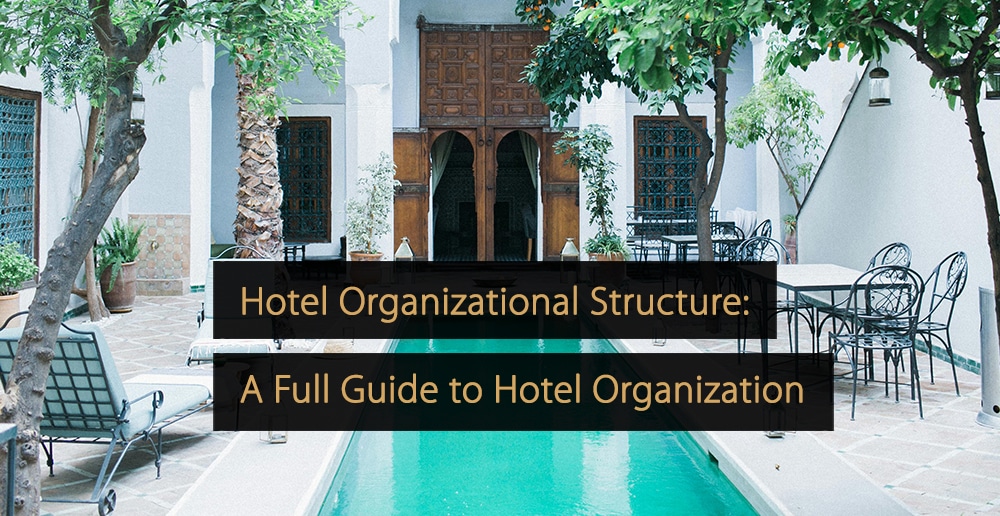A hotel concierge is a specialist customer service representative tasked with receiving guests, responding to guest needs, and helping to provide a pleasant all-around guest experience. In this article, you can learn more about a hotel concierge, what the role entails, and why these guest service reps are so valuable.
Table of Contents:
- The Hotel Industry Explained
- What is a Hotel Concierge?
- Responsibilities of a Hotel Concierge
- Requirements for a Hotel Concierge
- What Is Les Clefs d’Or?
- How Hotel Concierges Maximize Guest Satisfaction
- Skills Needed for Success as a Hotel Concierge
- The Benefits of the Hotel Concierge
- Understanding the Main Hotel Departments
The Hotel Industry Explained
Before explaining the role of a hotel concierge, it is essential to define the hotel industry. The term ‘hotel industry’ refers to a specific section of the service industry concerned with providing temporary overnight accommodation for guests in exchange for payment.
Despite the name, the hotel industry encompasses all businesses that offer short-term lodgings and related services. This includes motels, holiday cottages, bed and breakfasts, inns, resorts, hostels, and other forms of accommodation. However, the accommodation must be short-term and must allow for overnight stays.
In the article “Hotel Industry: Everything You Need to Know About Hotels!” you can explore this topic in greater depth, learning how the industry is defined and what it includes, while also exploring topics like the value of star ratings, the importance of hotel revenue management, and the most significant technology trends.
What is a Hotel Concierge?
A hotel concierge is an employee responsible for receiving guests and responding to guests’ needs to improve the customer experience. Sometimes referred to as a guest services representative or a guest relations manager, the job usually forms part of the hotel front office department.
The aim of employing somebody in this position is to have a staff member available to serve guests while maintaining their happiness. A good hotel concierge will be a reliable resource for guests to turn to in times of need and will function as the friendly face of the business and an excellent first point of contact.
Responsibilities of a Hotel Concierge
Equipped with an understanding of what a hotel concierge is, it can also be useful to learn about the role’s main responsibilities. While precise duties can vary depending on the property, the facilities available, and the types of guests, a hotel concierge will greet guests and complete personalized tasks.
Examples of some of the specific tasks a hotel concierge may need to perform include: arranging taxis or other forms of transportation for guests; providing information to guests about local attractions or places of interest; managing reservations for hotel facilities, such as spa treatments and the restaurant; and managing housekeeping requests.
A hotel concierge may also need to coordinate luggage assistance services, make intelligent recommendations about places to visit, secure tickets for entertainment venues on behalf of guests, and manage deliveries and messages. In some ways, a hotel concierge can be viewed as a personal assistant for the hotel’s customers.
Requirements for a Hotel Concierge
Regarding requirements for the role, most hotels will expect candidates to have a high school diploma or equivalent; in many cases, there may even be a need for a bachelor’s degree. However, education requirements largely depend on the employer, and top-class hotels in busy locations usually have higher requirements.
In some cases, preference may go to applicants with a degree in a relevant field, like tourism or hospitality. Prior experience working within the hotel industry can also be advantageous, while applicants from outside the industry may have improved prospects if they have worked in a customer service role.
Apart from education and work experience requirements, a hotel concierge must communicate well and be passionate about helping people. It will be important to possess problem-solving skills, while time management, organizational skills, and the ability to think on your feet are also necessary.
What Is Les Clefs d’Or?
Les Clefs d’Or, which translates to ‘The Golden Keys’, is the name of a professional association for hotel concierges. It is an exclusive organization with around 4,500 members worldwide and chapters in many countries. Most hotel concierge workers are not part of Les Clefs d’Or.
To gain membership, a hotel concierge will need to have significant experience in the industry. Each chapter will have slightly different entry requirements. Still, it will usually be necessary to be employed by a hotel with an excellent reputation, to submit a resume, provide letters of reference, and complete an interview.
Successful applicants become recognized members and will be provided with a badge, which will appear as two crossed keys. This is often viewed as a symbol of excellence, and properties may highlight concierge staff with this status within hotel marketing, as it implies that guests will receive a very high level of service.
Video: What is it to be a “Les Clefs d’Or” Concierge?
How Hotel Concierges Maximize Guest Satisfaction
A hotel concierge optimizes guest satisfaction, which requires specific capabilities. In the sections below, you can learn how these employees maximize satisfaction rates.
Get Tickets/Taxis When Seemingly Impossible
One of the biggest ways a hotel concierge can maximize guest satisfaction is by managing to acquire tickets to events or secure transportation via a taxi or chauffeur, even when it is seemingly impossible to do so. This may include securing transport even when companies say they are fully booked or securing sold-out show tickets.
A great concierge will build and maintain contacts over time and effectively use hotel technology to stay in touch. For instance, acquiring tickets to sold-out sporting events may be possible if a concierge knows some ticket holders who may not necessarily be using their tickets or are willing to sell. Alternatively, acquiring VIP tickets may be possible if you have professional contacts at the venue itself.
Arrange Special Celebrations
The best concierge staff in the hotel industry will go above and beyond for guests, including arranging celebrations for guests with special events that coincide with their stay. Examples include significant birthdays or anniversaries, weddings and honeymoons, or plans to propose to a partner.
A hotel concierge will already have direct lines of communication with the different departments, and this can make it easy to make special requests to restaurant staff or ensure housekeeping staff knows to do something special in the room. Making arrangements with other businesses, such as local bakers and photographers, may be possible.
Help With Special Travel Problems
Many hotel marketing strategies will emphasize the great experiences available to guests, and nobody wants to consider the possibility of encountering problems during their holiday. Still, a great hotel concierge will be able to solve problems even if things go badly wrong.
This could mean arranging appointments for guests who need to visit the local embassy or arranging alternative travel in the event of cancellations or missed departures. Sometimes, it could even mean liaising with other hotel departments to arrange room switches, maintenance work, or technology repairs.
Arrange Itineraries Beforehand
It is important to understand that the role of the hotel concierge is not restricted solely when guests are present within the property. The best workers can assist guests before their arrival, especially when planning an itinerary. This can then make the entire travel experience more enjoyable for guests.
A hotel concierge will be aware of local issues, such as travel restrictions or venue closures. They will also be aware of hotel trends. They can help plan an achievable itinerary, allowing guests to experience the main attractions while providing them with sufficient time to enjoy the hotel’s facilities.
Skills Needed for Success as a Hotel Concierge
In the following paragraphs, learn about the skills that make a great hotel concierge.
Communication
A hotel concierge needs to be able to convey information clearly, both verbally and in writing. A major part of the role is communicating with guests, face-to-face and via phone. You need to be able to answer questions and provide information in a way that’s effective and makes the customer feel appreciated and heard. As a concierge, you’ll also need to communicate with hotel management and other departments, relaying guests’ requests and other messages to hotel staff members.
Administrative skills
Like good communication skills, good admin skills are valuable to a hotel concierge. You must complete many tasks throughout the day, including making and receiving phone calls, sending emails, and keeping records. Good admin skills will help you with these and other important duties for a hotel business. This skill set can be beneficial in any office environment, which extends to hotel departments.
Organization
The role of a hotel concierge is a busy one, with many different calls on your time and a tightly packed schedule. Being able to organize your day effectively is a key skill. You need to be able to prioritize tasks that range from hotel security to housekeeping duties. This way, all your projects and duties will be completed, and time-sensitive tasks will not be overlooked.
Customer service
A concierge deals with the public constantly. You’ll need to interact with guests throughout the day in this role. This means that your customer service skills must be excellent, as you can significantly impact the quality of the guest experience. Being ready to answer questions and deal with problems in a friendly and respectful manner is a key skill. You’ll need to have a positive outlook and keep a cool head.
Problem-Solving Ability
As well as being organized and gifted with great communication skills, a hotel concierge needs to be a problem solver. You need to be able to find effective solutions for any issues that crop up throughout your day, whether it’s a problem that occurs within hotel operations or an issue that a guest is having during their stay. You need to be sharp, creative, and able to think outside the box.
Room Service
Taking guests’ orders and serving their food and drinks is important for a hotel concierge. You’ll likely be handling room service payments, so you’ll need to know how to use the hotel’s POS systems and handle transactions. Being able to offer an employer room service skills will be a major plus when you’re seeking a position, particularly if you’ll be working in a hotel with a restaurant on-site.
The Benefits of the Hotel Concierge
Here are some benefits of the hotel concierge that will help your hotel stand out.
Video: Hotel Productivity: Improve Your Hotel Concierge’s Job
Elevate Your Hotel’s Brand
A hotel concierge plays a major role in shaping a guest’s perceptions of the hotel as a whole. While hotel trends continuously evolve, the importance of a great first impression remains constant for everyone. Your role is to deliver excellence in customer service while navigating a fast-moving environment requiring technological know-how. You’ll have just moments to create that all-important first impression for each guest. Your abilities as a concierge are a key factor in creating and supporting your hotel’s brand. You need to keep this in mind every day.
Improved Guest Experience
A hotel stay is about more than just the accommodation. It’s about the experience. As well as maintaining good security and ensuring that everything runs smoothly, you’ll also be helping to create the guest experience. You’ll be the first point of contact for most guests when they arrive at the hotel and their main point of contact throughout their stay. You can enhance the guest experience by welcoming guests warmly as they arrive, helping with luggage, and ensuring they know about the hotel’s amenities and services. Guests also appreciate tips about local attractions and businesses they might enjoy.
Increasing Hotel Revenue
Optimizing hotel revenue is crucial in an increasingly competitive industry. As a concierge, you can help to accomplish this by delivering excellent customer service that creates loyal guests and generates positive word-of-mouth recommendations. When you enhance the guest experience through your competence, professionalism, and personality, you improve your hotel’s profile and the value of its brand. Meeting the needs of your guests doesn’t just mean one happy customer; it also shapes wider perceptions of your hotel when the guest describes their stay to others. This means additional bookings, increased revenue, and the ability to command higher rates.
Understanding the Main Hotel Departments
A hotel concierge forms part of the front office team, but hotel operations rely on various departments, which all need to work together. Examples include the food and beverage department, the housekeeping department, the reservations and marketing department, and the management and finance department.
In the article “Hotel Departments: Learn About All the 7 Sections of a Hotel”, you can learn about the main hotel departments, the employees who work within them, and their core duties and responsibilities.
Hotel Concierge FAQs
A hotel concierge is a specialist customer service representative tasked with receiving guests and helping them to enjoy the best possible experience while staying in a hotel or similar property. In many ways, the role resembles a personal assistant for guests, helping them with bookings, reservations, luggage issues and much more.
More Tips to Grow Your Business
Revfine.com is the leading knowledge platform for the hospitality and travel industry. Professionals use our insights, strategies, and actionable tips to get inspired, optimize revenue, innovate processes, and improve customer experience.Explore expert advice on management, marketing, revenue management, operations, software, and technology in our dedicated Hotel, Hospitality, and Travel & Tourism categories.
This article is written by:
Hi, I am Martijn Barten, founder of Revfine.com. With 20 years of experience in the hospitality industry, I specialize in optimizing revenue by combining revenue management with marketing strategies. I have successfully developed, implemented, and managed revenue management and marketing strategies for individual properties and multi-property portfolios.










Leave A Comment